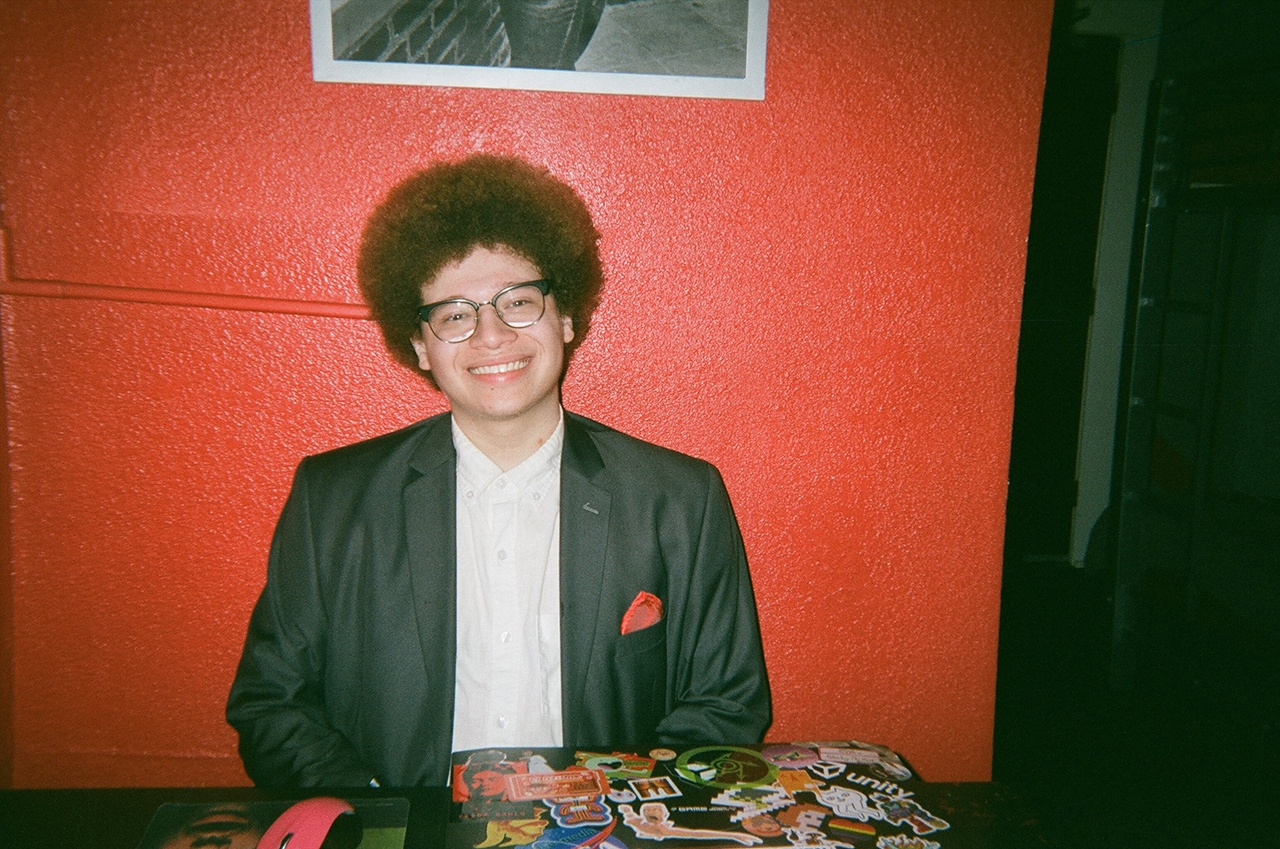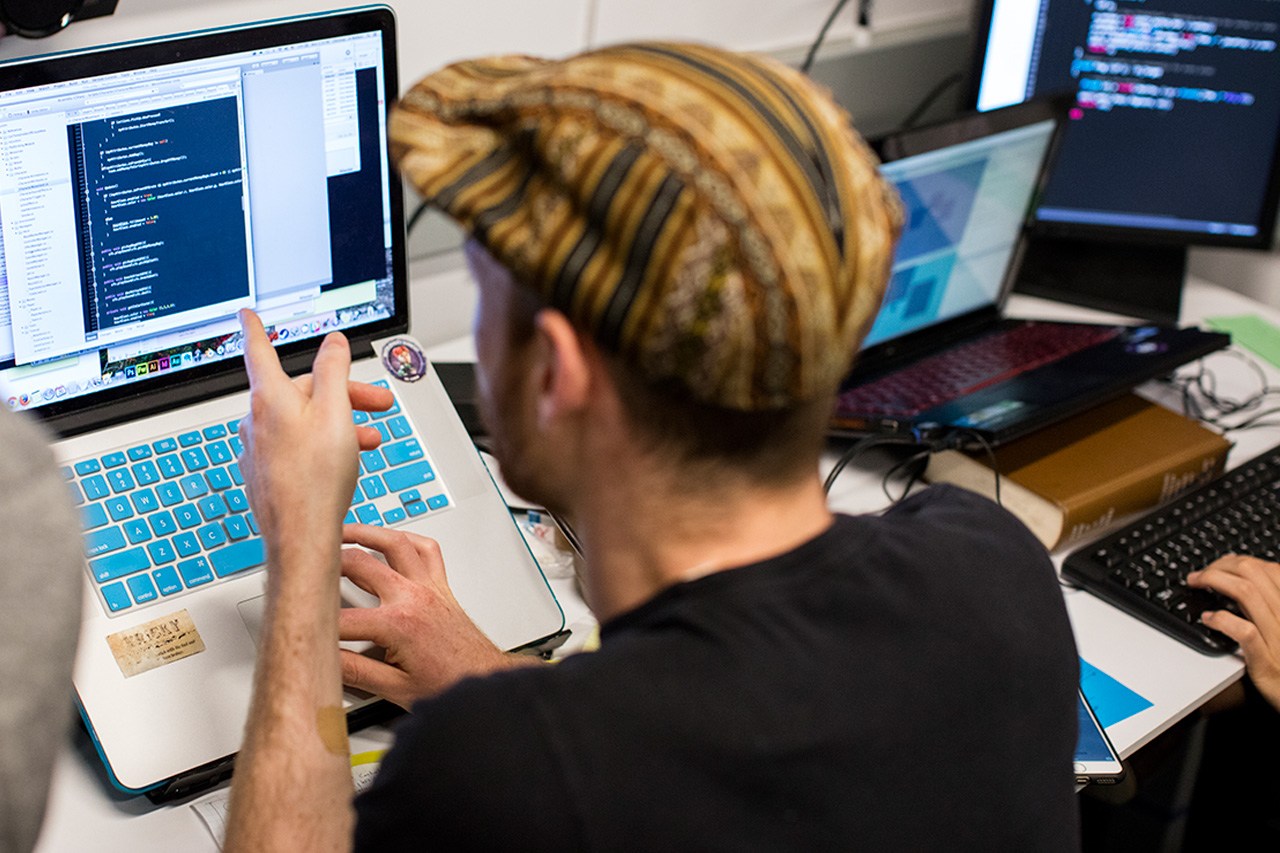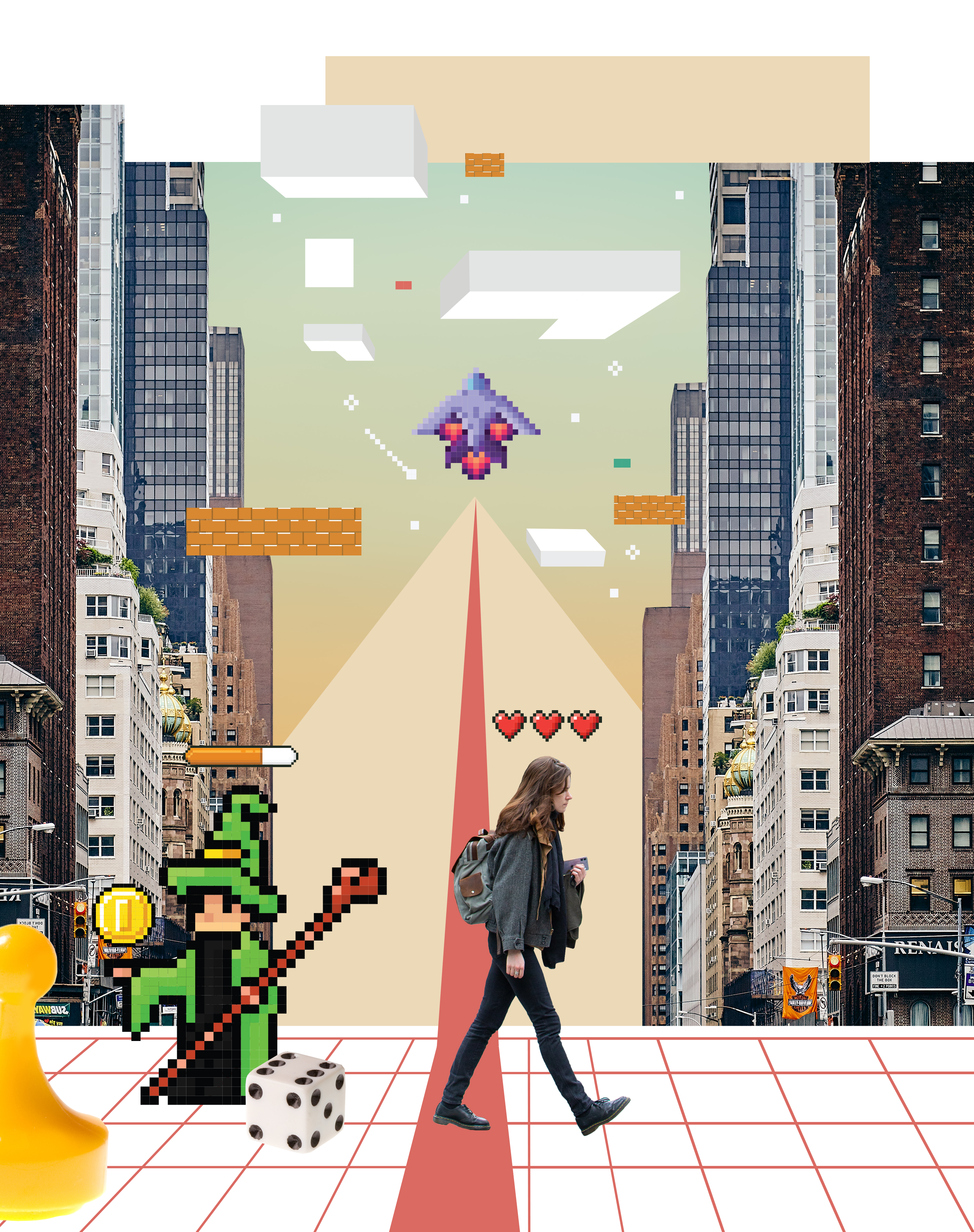
Whether you have a passion for the storytelling, artistry, or engineering behind games, you can sharpen your skills, collaborate with other creators, and share your work with engaged users through NYU’s unmatched opportunities. Choose a major like Game Design or Integrated Design and Media to dive deep into all things gaming. Or complement your studies in computer science or the arts by minoring in Game Engineering or Interactive Media Arts. Whatever you choose, you’ll get access to world-class teachers and tools. Your path to bringing your game ideas to life starts here.
Games as Art: Major and Minor in Game Design
For all-around game lovers, the Tisch School of the Arts Game Design major approaches the study of virtual and tabletop games as a serious and creative art form. Students improve their knowledge of gaming history and culture while specializing in their favorite area of game development. The interdisciplinary program includes coursework in three primary areas. First, game studies explores the emerging field of game scholarship. Next, game design focuses on game rules and the player experience. And finally, game development introduces students to the production of games. Additionally, game design students explore programming, visual design, audio design, and even business and marketing. Students finish out the program with a senior capstone project, a solo or group effort that can take many forms. For example, seniors might create a playable game, write a research paper, or curate an exhibit.
NYU Tisch also offers a minor in Game Design. So you can access the same incredible opportunities as the major while pursuing a different primary area of study. You’ll receive an introduction to the critical and historical analyses of games as a cultural form. Then, you’ll begin mastering the interdisciplinary craft of game development and production. Choose from classes like Introduction to Game Engines and Introduction to Programming for Games.
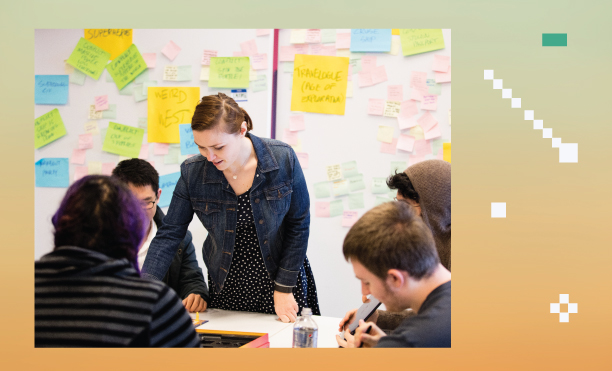
For the Maker: Integrated Design and Media
For creators more interested in production, the Tandon School of Engineering’s Integrated Design and Media major is a maker-centric, project-based program in which you research and develop your own work. Classes highlight four core areas: image, sound, narrative, and interactivity. You’ll study motion capture technology, virtual reality, 3-D modeling and animation, coding, and more. All the while, you’ll master cutting-edge technologies, tap into your creativity, and hone your critical thinking skills. What’s more, you’ll network with industry leaders through guest lecture series and conferences and showcase your abilities with a senior thesis project.
Tandon students have plenty of opportunities to work on projects outside of class as well. You can receive course credit while gaining practical experience through an internship at a gaming company or tech start-up. Or, through the Tandon Vertically Integrated Projects Program, you can join a team and work toward creating a finished product to showcase your skills and directly impact users.
Focus on the User: Interactive Media Arts
Interactive Media Arts (IMA), offered at both NYU Tisch in New York City and NYU Shanghai, combines practice with theory and engineering with art. Students gain fluency in many forms of digital interactivity while building a robust foundation in the arts and liberal arts. The program touches on different layers of media, from developing software and fabricating material objects to constructing virtual and physical spaces. You’ll create and critique a number of digital tools and products, including games and social tools. Additionally, you’ll explore robotics, coding, and collective storytelling. Students also have the option to focus on gaming specifically with classes like Collective Play and Topics in Media Art: Alter Egos—Making Physical Game Interfaces Useless Machines. Graduating seniors complete a two-semester capstone project. This includes an interactive project, research paper, and personal portfolio.
For students who want to combine IMA with another area of study, Tisch also offers an IMA minor.
The Fabrication Lab at NYU Shanghai is a dedicated digital manufacturing workspace. Here, IMA students can access state-of-the-art tools, like 3-D printers and laser cutters, to transform their ideas into physical creations.
Bring Your Idea to Life: The Interactive Media Major and Minor at NYU Abu Dhabi
NYU Abu Dhabi’s Interactive Media program analyzes communication and media technologies and tools. Offered as both a major and minor, the program explores the usage of various media for creative expression, communication, and participation. You’ll acquire skills in electronics, programming, design, and digital media. In addition, you’ll examine the latest technological developments that are changing the future of gaming as we know it. The curriculum is project-based, the atmosphere is supportive and collaborative, and there’s a unique emphasis on bringing your creative ideas to life, from concept to prototype.
Build Your Game: The Game Engineering Minor
Game designers and programmers are in high demand in today’s global video game market. To this end, NYU Tandon’s Game Engineering minor will prepare you to take your place in this rapidly growing industry. With an emphasis on programming skills and game engineering, the minor is designed specifically for students with a computer science background. You’ll build games from the ground up and take studio art–style courses. What’s more, you can take electives on topics like human-computer interaction, artificial intelligence, and interactive computer graphics.
Tools of the Trade
Game design students practice their skills and connect with others in the gaming community through cutting-edge facilities and only-at-NYU opportunities.
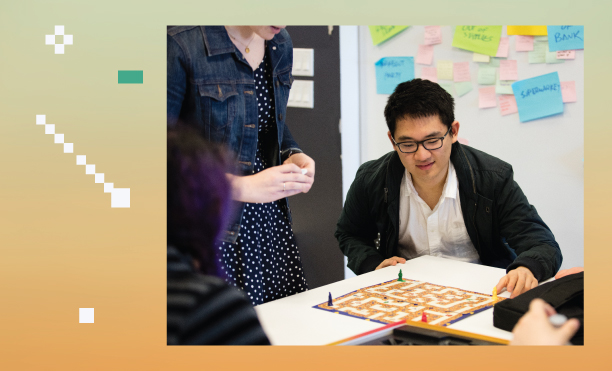
The NYU Game Center
For students interested in gaming, the NYU Game Center offers a wealth of great resources beyond the classroom. There are many workshops and events to round out your coursework and expose you to different topics in the field. Plus, the center is a perfect place to make connections. Industry members present at events, guest lecturers visit classes, and local developers playtest their games on-site. Through these and other opportunities, the center helps students find internships and jobs to set them up for future success. Furthermore, graduating students can apply to the Game Center Incubator. Here, they’ll find space, funding, and expertise to guide their independent projects with commercial potential through public launch.
With more than 2,000 digital and nondigital games, the NYU Game Center Open Library in Brooklyn has one of the largest game collections in the world. In addition to giving students a chance to play, the library regularly hosts events about game history and preservation.
Tandon Game Innovation Lab
At the Tandon Game Innovation Lab, students work with faculty mentors, industry partners, and members of international research facilities to challenge conventions and break barriers in the industry. The lab hosts its own lectures, panels, and workshops as well as a few game-focused courses. While it is mostly geared toward graduate students, some advanced undergraduate students are invited to work on projects and conduct research each year. In the past projects have included games with advanced user interface techniques. For instance, participants have developed a surveillance camera–enabled public game and an award-winning smartphone-based dance battle game. Moreover, students have explored automatic rigging of 3-D models, researched games for learning, and developed playful interfaces for security and authentication purposes.
NYU Game Center Showcase
Each spring, seniors in the Tisch BFA in Game Design program share their capstone projects with the world at the NYU Game Center Showcase. The event features digital and nondigital games made in design, studio, and development courses at the NYU Game Center. Most recently, the showcase took place on two different mediums—virtually on Twitch, featuring a livestream of interviews with BFA capstone students, and in person, with members of the public coming together to playtest more than 35 digital student projects. Every student with a capstone project has the opportunity to present their work at this yearly event.
So, what can you expect at the showcase? Last year, players explored the earthly paths they’ve chosen while riding an elevator to the afterlife in What Comes Before. Students Brydon Yao, Cara Outar, Geneva Heyward, Miles Rosenthal, Philip Park, and Ronojoy Mitra developed the game. In Split Seas II, a game by students Luke Lin, Jordan Grayson, and Joseph Gordesky, players collaborated to solve puzzles during a relaxing submarine journey through ancient underwater ruins. And they experienced the sensation of driving a spaceship through the aftermath of a climate apocalypse to deliver aid in Kinship, a virtual reality simulation created by students Nate Smith, Nancy Wang, Finn Carney, Alekai McAdam, Zachary Stephens, Axel Kazis-Taylor, Eliot Eisner, Asha Berry, and Morhan Yang.
Every week at Playtest Thursdays, students head to the NYU Game Center to connect with the gaming community. There, you can get feedback on your newest game, meet with local game designers, have a blast playing games others created—or simply enjoy the free pizza.
Student Game Spotlight: “Letter Lattice”
In game design student Ethan Zarov’s anagram-based puzzle game, Letter Lattice, players slowly morph one word into another by changing one letter. First, you solve simple puzzles to learn the ropes. Then, you move on to advanced rounds that challenge your vocabulary and dexterity. The game features 800 manually crafted puzzles as well as six million procedurally generated ones for novices and wordsmiths alike. Ethan’s game was a finalist for the Best Student Game award at the 2022 NYU Game Center Independent Games Festival. Ethan, a Game Design major with a Computer Science minor, explains, “Letter Lattice takes the best parts of anagram and crossword games and combines them into challenging word-weaving madness. I made this game in appreciation for the intertwining nature of words in the English language.” Currently, Ethan is working on Bumble Bubbles, a word game with bubble-popping game mechanics.

